Abmac Tablet 10's
MRP ₹280
(Inclusive of all Taxes)
₹42.0 Cashback (15%)
Provide Delivery Location
Online payment accepted
 Prescription drug
Prescription drugWhats That
Manufacturer/Marketer :
Consume Type :
Expires on or after :
Return Policy :
About Abmac Tablet
Abmac Tablet belongs to the class of drugs called respiratory stimulants primarily used to prevent and treat symptoms of asthma and chronic obstructive pulmonary disease (COPD). Asthma is a chronic (long-term) respiratory condition in which airways narrow, swell, and produce extra mucus, leading to difficulty breathing. COPD is a group of lung diseases with emphysema (shortness of breath) and chronic bronchitis (inflammation of the lining of bronchial tubes).
Abmac Tablet is a combination of three drugs, namely: Acebrophylline (bronchodilator), Desloratadine (antihistamine), and Montelukast (leukotriene receptor antagonist). Acebrophylline works by relaxing muscles and widening the airways of the lungs. Additionally, it also acts as a mucolytic (cough/sputum thinner) agent and helps in thinning and loosening phlegm (mucus) in the lungs, windpipe, and nose. Thereby helps to cough out easily and makes breathing easier by opening airways. Desloratadine works by blocking the action of histamine, a substance responsible for causing allergic reactions. Montelukast works by blocking the action of chemicals called leukotrienes that cause inflammation (swelling) and increased mucus production in the airways. Thereby reducing inflammation, mucus production, and narrowing in the airways.
Take Abmac Tablet as prescribed. You are advised to take Abmac Tablet for as long as your doctor has recommended it based on your medical condition. Some people may experience nausea, vomiting, stomach upset, headache, and restlessness. Most of these side effects of Abmac Tablet do not require medical attention and gradually resolve over time. However, if the side effects persist or worsen, please consult your doctor.
If you are allergic to Abmac Tablet or any other medicines, please tell your doctor. If your breathing worsens or you often wake up at night with asthma or experience chest tightness in the morning, please consult a doctor immediately, as these might be signs indicating that your asthma is not controlled properly and requires an alternate or additional treatment. If you are pregnant or breastfeeding, it is advised to inform your doctor before using Abmac Tablet . Do not take Abmac Tablet if you have a heart rhythm disorder that causes fast heartbeats. Avoid taking Abmac Tablet if you have low blood pressure, irregular heartbeats, hemodynamic instability (unstable blood pressure), had a heart attack, kidney or liver diseases.
Uses of Abmac Tablet
Directions for Use
Key Benefits
Abmac Tablet contains Acebrophylline (bronchodilator), Desloratadine (antihistamine), and Montelukast (leukotriene receptor antagonist) used to prevent and treat symptoms of asthma and chronic obstructive pulmonary disease (COPD). Acebrophylline relaxes muscles and widens the airways of the lungs. Additionally, it also acts as a mucolytic (cough/sputum thinner) agent and helps in thinning and loosening phlegm (mucus) in the lungs, windpipe and nose. Thereby, helps to cough out easily and makes breathing easier by opening airways. Desloratadine is an anti-allergic drug that helps to provide relief from allergy symptoms such as sneezing, running nose, watery eyes, itching, swelling, and congestion or stiffness. Montelukast reduces inflammation, mucus production and narrowing in the airways. Abmac Tablet helps to prevent an asthma attack.
Storage
- Inform your doctor about the nausea and discuss possible alternatives to the medication or adjustments to the dosage.
- Divide your daily food intake into smaller, more frequent meals to reduce nausea.
- Opt for bland, easily digestible foods like crackers, toast, plain rice, bananas, and applesauce.
- Avoid certain foods that can trigger nausea, such as fatty, greasy, spicy, and smelly foods.
- Drink plenty of fluids, such as water, clear broth, or electrolyte-rich beverages like coconut water or sports drinks.
- Use ginger (tea, ale, or candies) to help relieve nausea.
- Get adequate rest and also avoid strenuous activities that can worsen nausea.
- Talk to your doctor about taking anti-nausea medication if your nausea is severe.
- Record when your nausea occurs, what triggers it, and what provides relief to help you identify patterns and manage your symptoms more effectively.
- Preventing Vomiting (Before it Happens)
- Take medication exactly as prescribed by your doctor. This can help minimize side effects, including vomiting.
- Having a small meal before taking your medication can help reduce nausea and vomiting.
- Talk to your doctor about taking anti-nausea medication along with your prescribed medication.
- Managing Vomiting (If it Happens)
- Try taking ginger in the form of tea, ale, or candy to help alleviate nausea and vomiting.
- What to Do if Vomiting Persists
- Consult your doctor if vomiting continues or worsens, consult the doctor for guidance on adjusting your medication or additional treatment.
- Hydrate your body: Drink enough water to prevent dehydration and headaches.
- Calm Your Mind: Deep breathing and meditation can help you relax and relieve stress.
- Rest and Recharge: Sleep for 7-8 hours to reduce headache triggers.
- Take rest: lie down in a quiet, dark environment.
- Cold or warm compresses can help reduce tension.
- Stay Upright: Maintain good posture to keep symptoms from getting worse.
- To treat headaches naturally, try acupuncture or massage therapy.
- Over-the-counter pain relievers include acetaminophen and ibuprofen.
- Prescription Assistance: Speak with your doctor about more substantial drug alternatives.
- Severe Headaches: Seek emergency medical assistance for sudden, severe headaches.
- Frequent Headaches: If you get reoccurring headaches, consult your doctor.
- Headaches with Symptoms: Seek medical attention if your headaches include fever, disorientation, or weakness.
- Restlessness is related to mental health and needs medical attention if it's severe.
- Regular practice of meditation and yoga can help calm your mind. This can reduce restlessness.
- Prevent smoking as it can impact your calmness of body and mind.
- Talk to your friends and family about restlessness, who can provide a solution for why you feel restless.
- Get sufficient sleep for a minimum of 6-7 hours to reduce restlessness.
Drug Warnings
If you are allergic to Abmac Tablet or any other medicines, please tell your doctor. If your breathing worsens or you often wake up at night with asthma, experience chest tightness in the morning, please consult a doctor immediately as these might be signs indicating that your asthma is not controlled properly and requires an alternate or additional treatment. Regular monitoring of potassium levels is recommended while taking Abmac Tablet as it may cause low potassium levels in the blood. If you are pregnant or breastfeeding, it is advised to inform your doctor before using Abmac Tablet . Do not take Abmac Tablet if you have a heart rhythm disorder that causes fast heartbeats. Avoid taking Abmac Tablet if you have low blood pressure, irregular heartbeats, hemodynamic instability (unstable blood pressure), had a heart attack, kidney or liver diseases.
Drug-Drug Interactions
Drug-Drug Interactions
Login/Sign Up
Co-administration of Abmac Tablet with Isocarboxazid can increase the risk of CNS depression.
How to manage the interaction:
Taking Abmac Tablet with Isocarboxazid together can possibly result in an interaction, but it can be taken if a doctor has advised it. Do not stop using any medications without talking to a doctor.
Co-administration of Ivacaftor and Abmac Tablet can increase the levels of Abmac Tablet.
How to manage the interaction:
Co-administration of Abmac Tablet with Ivacaftor can possibly result in an interaction, but it can be taken if doctor has advised it. Do not stop using any medications without talking to a doctor.
Co-administration of Abmac Tablet with Tranylcypromine may increase the risk or severity of CNS depression (decreased heart rate, decreased rate of breathing, loss of consciousness).
How to manage the interaction:
Although there is an interaction between Abmac Tablet with tranylcypromine, but it can be taken if a doctor has advised it. However, if you experience any unusual symptoms contact your doctor immediately. Do not discontinue any medications without consulting a doctor.
Coadministration of Rifapentine with Abmac Tablet may reduce the blood levels and effects of Abmac Tablet. This can lead to low treatment outcomes.
How to manage the interaction:
Taking Rifapentine with Abmac Tablet together can possibly result in an interaction, it can be taken if your doctor has advised it. If you experience increased side effects such as headache, fever, sore throat, cough, abdominal pain, diarrhea, earaches, runny nose, or behavior and mood changes consult a doctor. Do not discontinue any medications without consulting a doctor.
Coadministration of Miconazole with Abmac Tablet may increase the blood levels and effects of Abmac Tablet. This increases the risk or severity of side effects.
How to manage the interaction:
Although there is a possible interaction between miconazole and Abmac Tablet, you can take these medicines together if prescribed by your doctor. However, if you experience any symptoms such as fever, sore throat, cough, stomach pain, diarrhea, earache, runny nose, or uncommon, depression, confusion, difficulty concentrating, anxiety, hallucinations, irritability. memory impairment, restlessness, sleep walking, Consult a doctor immediately. Do not stop using medications without a doctor's advice.
Coadministration of Abmac Tablet and Phenytoin may reduce the blood levels and effects of Abmac Tablet. This can lead to low treatment outcomes.
How to manage the interaction:
Taking Abmac Tablet and Phenytoin may interact with one another, but they can be taken together if your doctor has prescribed them. However, if you experience signs such as headache, fever, sore throat, cough, abdominal pain, diarrhoea, earache, runny nose, or behaviour and mood changes, consult a doctor immediately. Do not discontinue any medications without consulting a doctor.
Coadministration of Abmac Tablet and primidone can reduce the levels and effects of Abmac Tablet.
How to manage the interaction:
Taking Abmac Tablet and Primidone together can possibly result in an interaction, it can be taken if prescribed by a doctor. However, if you experience any unusual symptoms, contact a doctor immediately. Do not discontinue any medications without consulting a doctor.
Coadministration of Abmac Tablet and rifabutin can reduce the levels and effects of Rifabutin. This can lead to low treatment outcomes.
How to manage the interaction:
Taking Abmac Tablet and rifabutin together can possibly result in an interaction, it can be taken if your doctor has advised it. However, if you experience increased side effects such as headache, fever, sore throat, cough, abdominal pain, diarrhea, earache, runny nose, or behavior and mood changes consult a doctor. Do not discontinue any medications without consulting a doctor.
Drug-Food Interactions
Drug-Food Interactions
Login/Sign Up
Diet & Lifestyle Advise
- Eat foods rich in potassium such as tomatoes, bananas, asparagus, oranges, potatoes, avocados, dark leafy greens, and beetroots as potassium is important for lung function and a deficiency in potassium may cause breathing problems.
- Drink plenty of fluids every day to thin mucus which makes it easier to cough out.
- Avoid foods such as cabbage, beans, garlic, onions, shrimp, pickled food, dried fruits, fried foods, carbonated drinks, wine, bottled lemon, and lime juice as it may worsen asthma symptoms.
- Exercise regularly to strengthen your breathing muscles and boost your immune system. Learning breathing exercises will help you move more air in and out of your lungs.
- Do meditation, deep breathing, regular exercise, and try progressive muscle relaxation techniques to get relief from stress and reduce the risk of an asthma attack.
- Quit smoking as it may reduce the effectiveness of the Abmac Tablet and irritate the lungs and worsen breathing problems.
Side Effects of Abmac Tablet
- Nausea
- Vomiting
- Stomach upset
- Headache
- Restlessness
Habit Forming
Therapeutic Class
All Substitutes & Brand Comparisons
RX
PHILMONT TABLET 10'S
ELIS Pharmaceuticals India Pvt Ltd
₹233
(₹20.97 per unit)
16% CHEAPERRX
Out of StockAcemon-DL Tablet 10's
Clarivo Pharma Pvt Ltd
₹245
(₹22.05 per unit)
12% CHEAPERRX
Bigphylin Plus Tablet 10's
ZRS Labs
₹253
(₹22.77 per unit)
9% CHEAPER
Author Details
We provide you with authentic, trustworthy and relevant information
Drug-Diseases Interactions
Drug-Diseases Interactions
Login/Sign Up
FAQs
Drug-Drug Interactions Checker List
- FUROSEMIDE
- ALLOPURINOL
- CIMETIDINE
- CIPROFLOXACIN
- ERYTHROMYCIN
- AZITHROMYCIN
- AMOXICILLIN
- DOXYCYCLINE
- DILTIAZEM
- VERAPAMIL
- ISOPRENALINE
- THIABENDAZOLE
- KETOCONAZOLE
- FLUOXETINE
- PREDNISONE
- ETHINYLESTRADIOL
Disease/Condition Glossary
Asthma: It is a chronic (long-term) respiratory condition in which airways narrow, swell, and produce extra mucus, leading to difficulty in breathing. The symptoms of asthma include wheezing (whistling sound while breathing), shortness of breath, chest tightness, and cough, especially at night. The symptoms of mild persistent asthma may occur more than 2 times a week and up to 4 nights in a month, whereas, in the case of severe persistent asthma, the symptoms occur several times every day and most nights. The asthma treatment includes medication, breathing exercises, and self-care.
Chronic obstructive pulmonary disease (COPD): It is a group of lung diseases with emphysema (shortness of breath) and chronic bronchitis (inflammation of the lining of bronchial tubes). The major cause of COPD is smoking tobacco. Also, long-term exposure to fumes and chemicals may lead to COPD. The symptoms include chronic cough, shortness of breath, or wheezing (whistle sound while breathing).

Have a query?
Alcohol
Safe if prescribed
Avoid consumption of alcohol with Abmac Tablet as it may increase drowsiness. Please consult a doctor before consuming alcohol with Abmac Tablet .
Pregnancy
Consult your doctor
Abmac Tablet is given to pregnant women only if the doctor thinks the benefits are greater than the risks. Therefore, please inform your doctor if you are pregnant before using Abmac Tablet .
Breast Feeding
Consult your doctor
It is unknown whether Abmac Tablet is excreted in human milk. Please consult a doctor before taking Abmac Tablet if you are breastfeeding.
Driving
Safe if prescribed
Drive only if you are alert after taking Abmac Tablet as it may cause drowsiness or dizziness in some people.
Liver
Consult your doctor
Take Abmac Tablet with caution, especially if you have a history of Liver diseases/conditions. The dose may be adjusted by your doctor as required.
Kidney
Consult your doctor
Take Abmac Tablet with caution, especially if you have a history of Kidney diseases/conditions. The dose may be adjusted by your doctor as required.
Children
Safe if prescribed
Abmac Tablet should be used with caution in children in doses as prescribed by a doctor.
Recommended for a 30-day course: 3 Strips

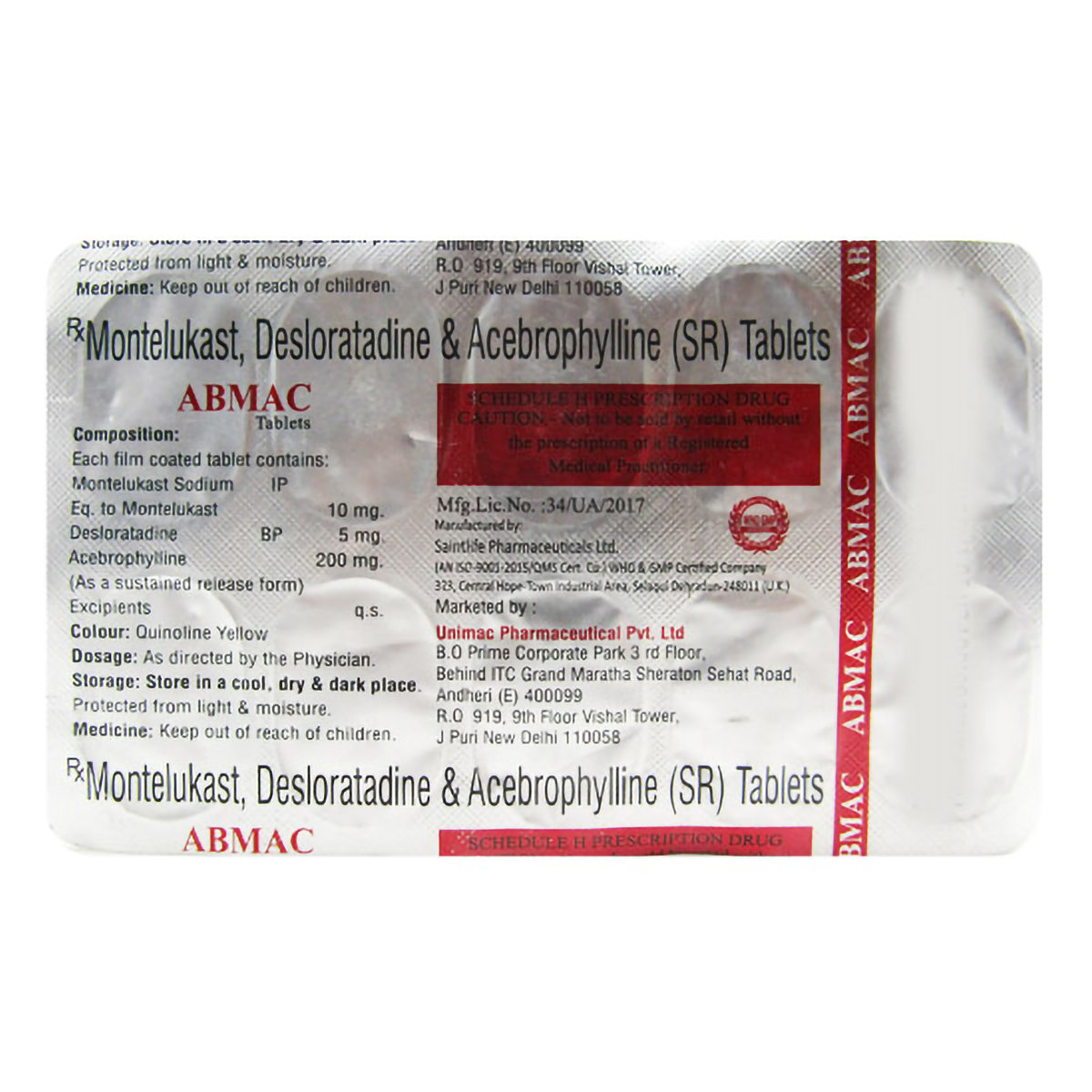


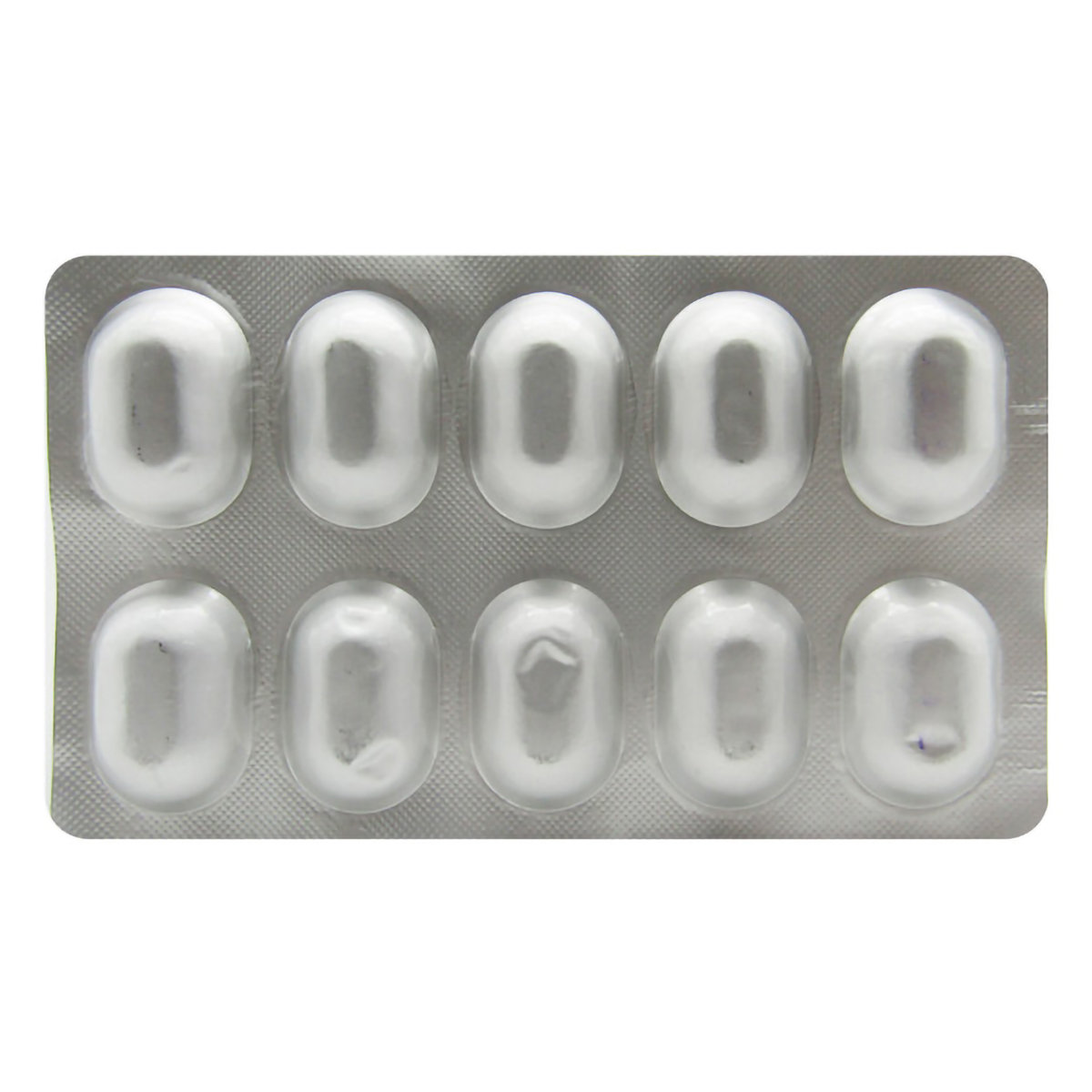






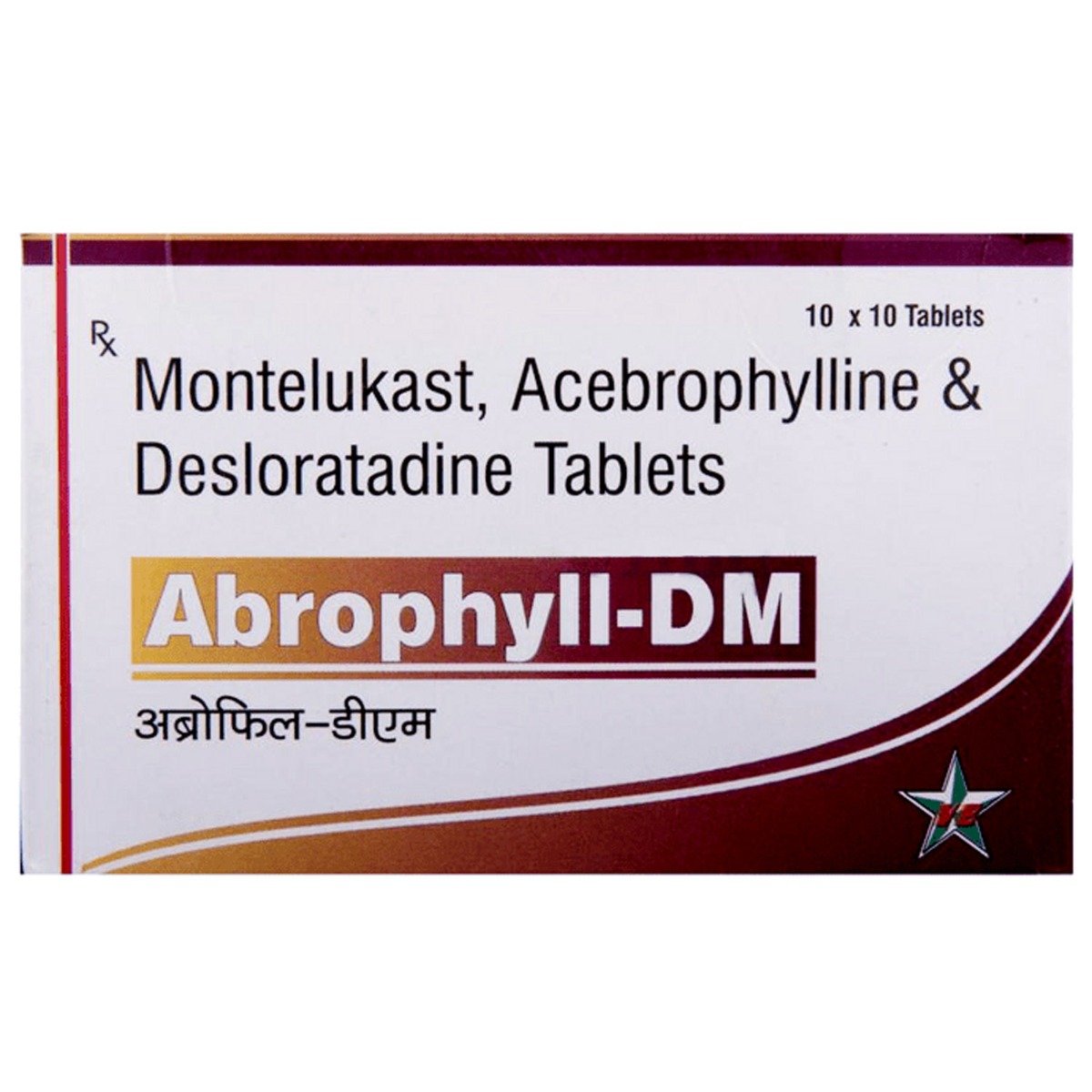
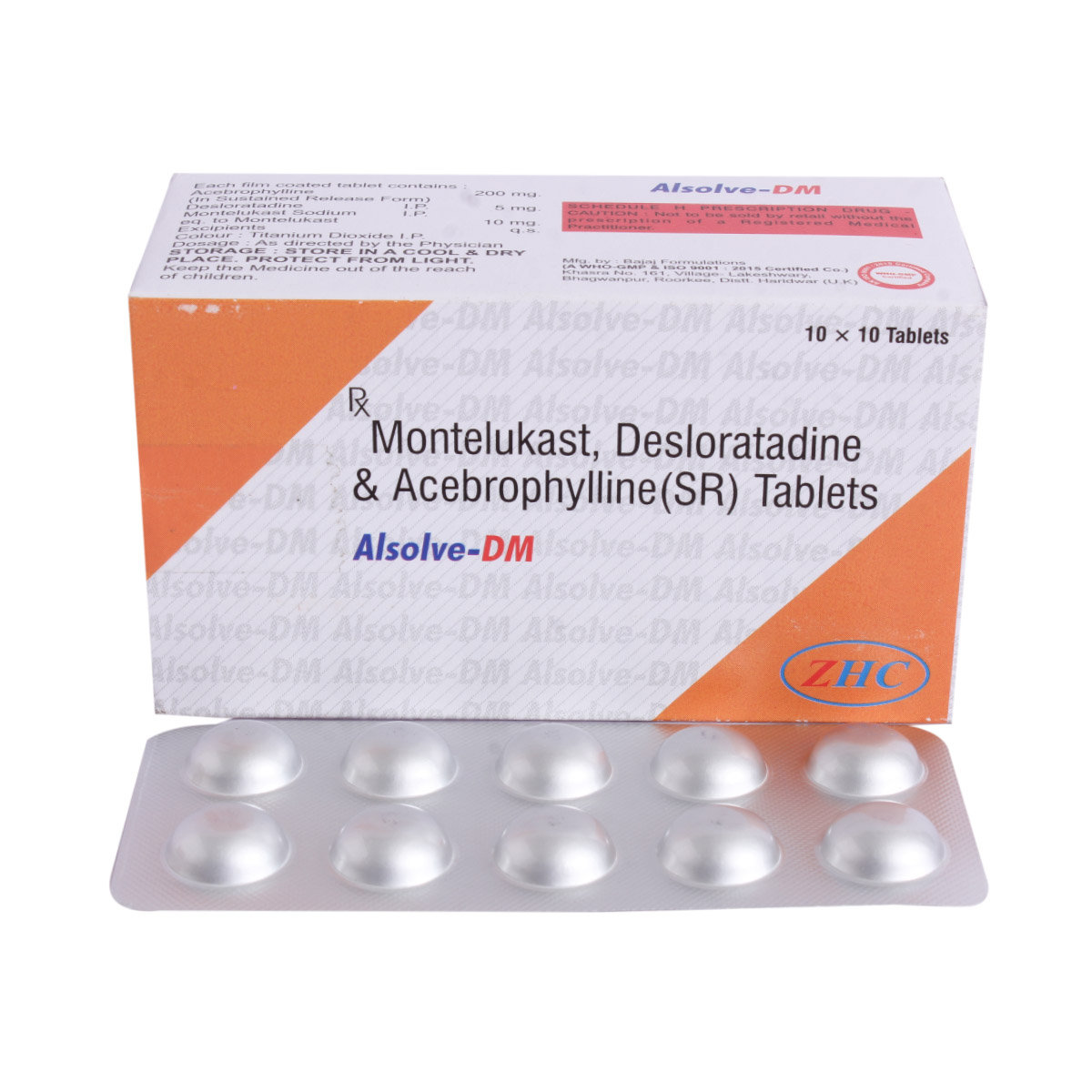
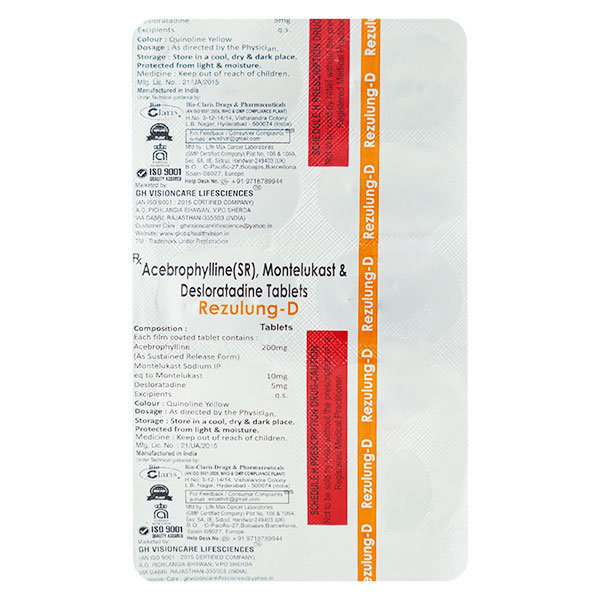


_0.jpg?tr=q-85)
